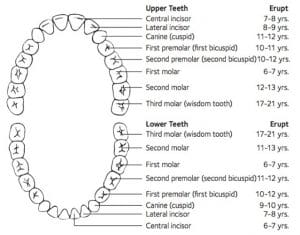 Healthy Mouths, Healthy Kids!
Healthy Mouths, Healthy Kids!
 The importance of baby teeth Baby teeth begin their development inthe womb but do not appear in the mouth until a baby is approximately six months old. The first tooth is usually the lower front tooth. Teeth may be present when a baby is born or first appear as late as twelve months of age.
The importance of baby teeth Baby teeth begin their development inthe womb but do not appear in the mouth until a baby is approximately six months old. The first tooth is usually the lower front tooth. Teeth may be present when a baby is born or first appear as late as twelve months of age.
These first teeth are of major importance to a child’s appearance, chewing ability, speech development, placement of their adult teeth, and the eventual health of their permanent teeth. Baby teeth hold the space for the permanent teeth and help guide them into the correct position.
They also contribute to healthy jaw development by guiding the jaws into position. Permanent teeth can become crowded when first teeth are removed too early. If baby teeth develop deep cavities, the infection can spread to the developing permanent teeth
in the gums below.
Permanent teeth usually start to erupt between the ages of five to six, the molars behind the back baby teeth. Kids will continue losing and replacing teeth until they are about fourteen years old.
What you need to do when you lose a tooth A tooth beginning to loosen can be exciting. When the tooth first becomes loose, go ahead and wiggle it. The tooth will naturally loosen over time, but you still should not put extra strain on the tooth.
Please avoid the “String and Slamming Door” method for tooth pulling. Remember, it’s important to keep the baby teeth in place until the adult teeth are ready to take their place.
Most baby teeth are lost in the same order they come in. You have the greatest chance of losing your front teeth first. There are instances where the assistance of a dentist is needed to remove the baby teeth, but this is rare. Keep an eye on the tooth; it should be very loose before additional action should be taken. A tooth that is ready to be removed will come out with a gentle tug. Using a dry paper towel to hold onto the loose tooth works well. A tooth that is ready to come out won’t bleed very much. Have a glass of cool salt water ready to rinse out
the mouth afterwards.
 If you accidentally swallow a baby tooth, don’t be alarmed! It happens. We have it on good authority that the Tooth Fairy accepts notes of explanation as well as actual teeth.*NB* Ages shown are averages; everybody is different!
If you accidentally swallow a baby tooth, don’t be alarmed! It happens. We have it on good authority that the Tooth Fairy accepts notes of explanation as well as actual teeth.*NB* Ages shown are averages; everybody is different!
 Thumb-sucking All babies are born with a natural sucking desire. This sucking desire is important. Without it, a baby wouldn’t be able to receive food in the early months of life. Sucking is also very comforting for a baby. For most babies, the sucking urge reaches a peak around the third or fourth month. After this stage, its urgency will lessen as the child finds new ways to interact with the world.The need for thumb (or pacifier) usually decreases after age two or three years. Sometimes, prolonged sucking after age five can cause problems with normal dental development. Usually, if sucking stops before the permanent teeth start to erupt, the long-term effect is minimal. Your dentist can share some ideas to help break the thumb-sucking habit!
Thumb-sucking All babies are born with a natural sucking desire. This sucking desire is important. Without it, a baby wouldn’t be able to receive food in the early months of life. Sucking is also very comforting for a baby. For most babies, the sucking urge reaches a peak around the third or fourth month. After this stage, its urgency will lessen as the child finds new ways to interact with the world.The need for thumb (or pacifier) usually decreases after age two or three years. Sometimes, prolonged sucking after age five can cause problems with normal dental development. Usually, if sucking stops before the permanent teeth start to erupt, the long-term effect is minimal. Your dentist can share some ideas to help break the thumb-sucking habit!

Brushing your teeth Brush your teeth twice a day – in the morning and before bedtime. Use a soft toothbrush and a pea-sized amount of fluoride-containing toothpaste. Brush carefully and thoroughly, ensuring that every surface is reached. Younger kids should have their parents or someone older supervise their brushing, just to make sure they are getting the hang of it and doing a good job!.

Flossing your teeth Flossing daily is an important and effective method of removing food particles and bacteria from around teeth. The floss is moved up and down the side of each tooth to clear away any food debris. The floss is also moved along the gum line to dislodge any trapped debris. Your dental hygienist can teach you how to floss effectively.
 Foods and snacks Eating healthy foods and snacks makes sense for lots of reasons. Limit foods and drinks with sugar because sticky, sugary foods stick to the grooves and fissures on the back teeth. Sugared chewing gum also should be avoided. If you do want to have the odd sugary snack, then it is best to have it at the end of a meal when saliva flow will help wash food debris away. Avoid sugary snacks between meals.
Foods and snacks Eating healthy foods and snacks makes sense for lots of reasons. Limit foods and drinks with sugar because sticky, sugary foods stick to the grooves and fissures on the back teeth. Sugared chewing gum also should be avoided. If you do want to have the odd sugary snack, then it is best to have it at the end of a meal when saliva flow will help wash food debris away. Avoid sugary snacks between meals. What is tooth decay? Tooth decay occurs when foods containing carbohydrates (sugars and starches) such as milk, juice, cereals, and cookies are frequently left on teeth. Bacteria that live in the mouth thrive on these foods, producing acids. Over time, the acids destroy enamel, resulting in cavities. Tooth decay can occur even from drinking milk.Tooth decay can be prevented. Cliffcrest Family Dental can help you reduce tooth decay with some easy techniques involving regular care under our guidance.
What is tooth decay? Tooth decay occurs when foods containing carbohydrates (sugars and starches) such as milk, juice, cereals, and cookies are frequently left on teeth. Bacteria that live in the mouth thrive on these foods, producing acids. Over time, the acids destroy enamel, resulting in cavities. Tooth decay can occur even from drinking milk.Tooth decay can be prevented. Cliffcrest Family Dental can help you reduce tooth decay with some easy techniques involving regular care under our guidance.
Oral health affects general health The mouth is full of bacteria – some good and some bad. Your body naturally tries to keep bacteria where it belongs. You can help by practising good oral hygiene. Bacteria sometimes get into places in your body that it should not be. When it does, there can be serious health consequences. For example, if the bacteria enter your bloodstream, it can cause an infection in the lining of the heart, called endocarditis. Research suggests a possible link between oral bacteria and heart disease, including increased risk of a heart attack or stroke. Tooth loss before age 35 may be linked to Alzheimer’s later in life.Poor oral health has been linked to diabetes, lung disease, and many other chronic health conditions. Starting kids on the right track for good dntal health makes sense for their overall health for a lifetime.
 Regular dental check-ups From the time that the first baby tooth erupts, regular dental check-ups are an important part of a good prevention programme. The dental check-up allows us to detect problems when they are small, in order to keep them from becoming worse. Regular dental cleanings by the dental hygienist remove plaque and tartar built up around teeth which cause tooth decay and gum disease.
Regular dental check-ups From the time that the first baby tooth erupts, regular dental check-ups are an important part of a good prevention programme. The dental check-up allows us to detect problems when they are small, in order to keep them from becoming worse. Regular dental cleanings by the dental hygienist remove plaque and tartar built up around teeth which cause tooth decay and gum disease.Regular check-ups allow us to monitor the growth of children’s teeth and jaws and to treat potential orthodontic problems before they become major ones. If dental fillings are placed, our regular check-ups allow us to monitor the wear on existing fillings, replacing those which are worn out before they begin to break down and allow the tooth underneath
to decay.
From reviewing current dental literature and from our own clinical observations, we feel that a policy of semi-annual check-ups, adopted by the Canadian Dental Association, provides a good preventive programme for children. Some children may need more frequent monitoring, some less, but the semi-annual dental check-up is designed to prevent costly long-term dental problems and enhance overall oral health.
